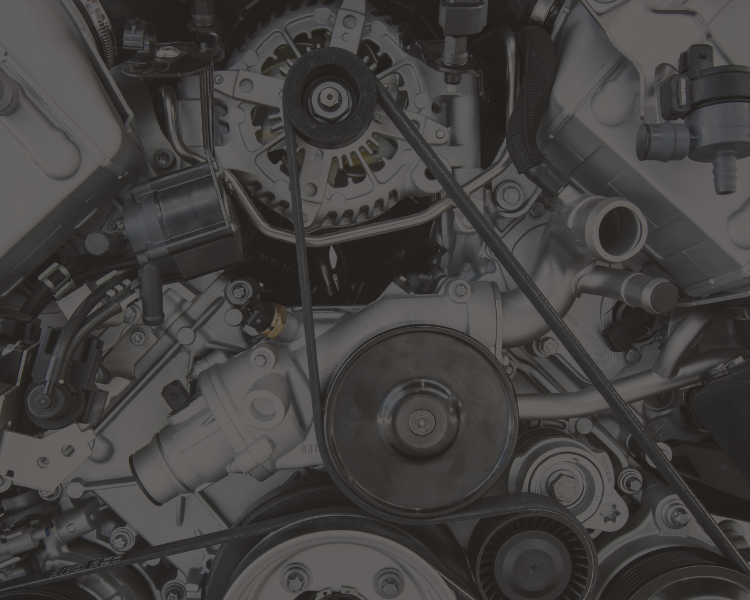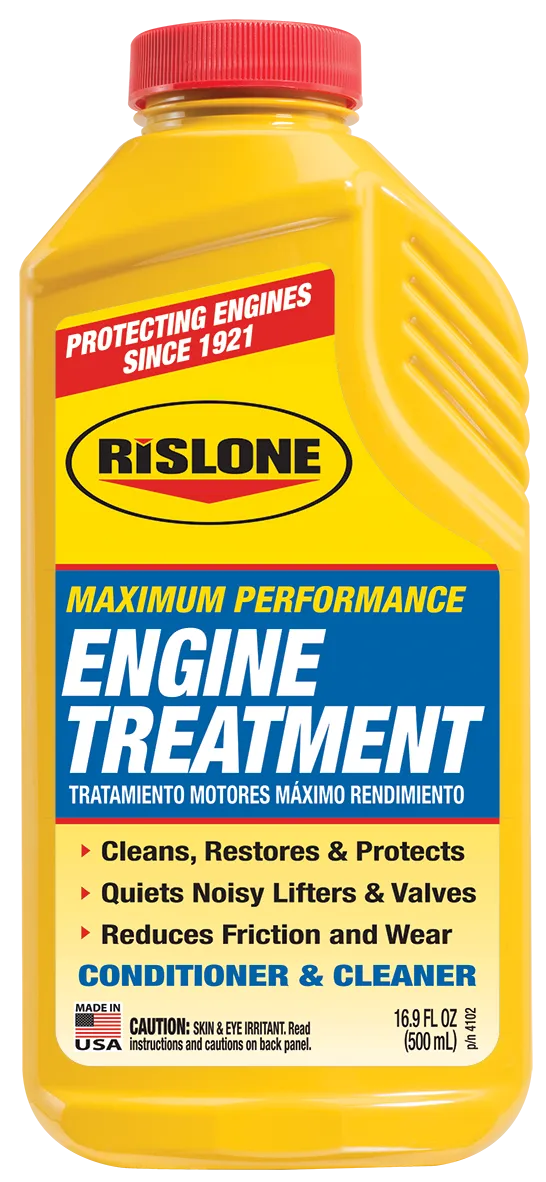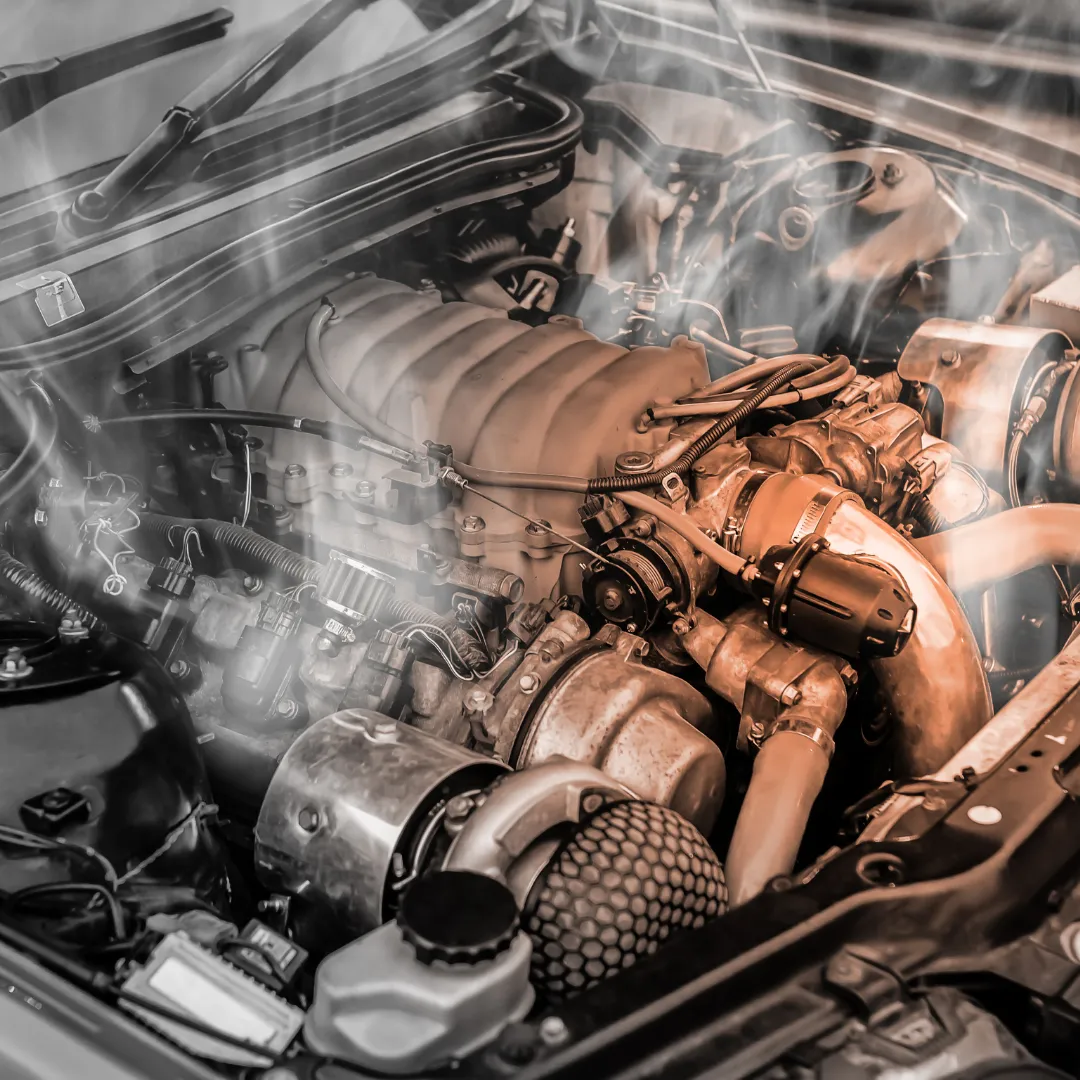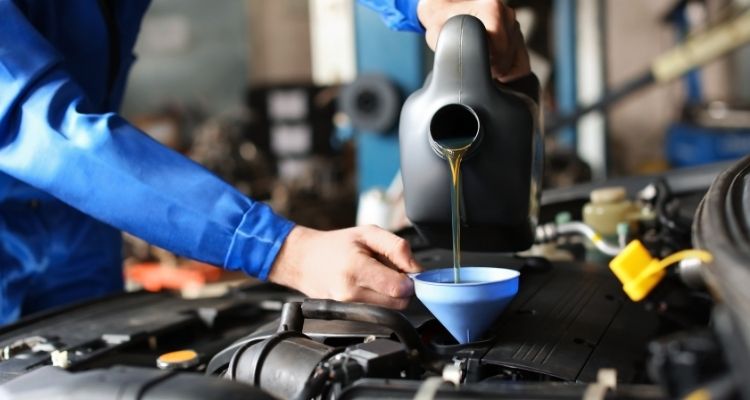Engine Performance Warning Signs
Trust us – pay attention to the subtle signs of engine failure. When you know the types of problems that can kill an engine and how they show themselves, you can repair the problem before you get stranded on the highway or suffer a catastrophic engine failure. Learn these warning signs and what to do to avoid them to ensure a less stressful life and reliable vehicle. We talk to customers every day about this stuff, so we’ve seen (and heard) a thing or two.
How to Know When an Engine Is About to Die
Your engine has several systems that must operate in tandem. Obviously, some components provide drivetrain propulsion, some allow you to steer and some assist in stopping your car. Because of today’s ECU-controlled cars (Electronic Control Unit), it’s possible that when even one system has a problem, your engine may shut itself down to prevent further damage to the vehicle as a whole. Ignoring such an incident could lead to your motor sustaining permanent damage and reaching the end of its life sooner than you ever expected.
1. Check Engine Light (also known as the CEL)
The first time many people notice an engine problem is when the check engine light activates on the dash. Many things can cause this light to come on; there’s no single simple explanation. You will need to pull the engine’s error code with a code reader. This coded feedback tells you the problem and its origin and allows you to diagnose a proper repair. If you still have a check engine light after making repairs, you may have multiple issues under the hood.
Common reasons your check engine light will come on include problems with the exhaust system, the fuel intake or the transmission system. We’ve seen most of these in our years of helping customers keep their cars on the road.
- Failed oxygen sensor: Your engine’s emission control system uses O2 sensors to gauge how much oxygen leaves your vehicle in the exhaust. A faulty O2 sensor, however, can cause your check engine light to come on and your car to run less efficiently. While this part does not need an immediate replacement to prevent a breakdown, your vehicle will fail any emissions inspection until you replace the sensor. This is a pretty common Check Engine Light root cause.
- Catalytic converter: To reduce the environmental impact of exhaust, your vehicle uses a catalytic converter. These devices chemically transform carbon monoxide to carbon dioxide and hydrocarbons into carbon dioxide and water. While catalytic converters should last for the life of your vehicle, if these parts fail, you will need to replace them. If you don’t, your engine will stall.
- Exhaust gas recirculation valve: The exhaust gas recirculation (EGR) valve sends unburned fuel back to the engine. This process allows your vehicle to use as much fuel as possible and reduce its output of dangerous hydrocarbons from unused gas. Knocking, a check engine light and rough idling indicate a clogged EGR valve. Again, this is a pretty common Check Engine Light cause.
- Spark plugs: Your spark plugs won’t last forever. These devices create the spark that ignites the gasoline in each cylinder. When your spark plugs fail, your engine won’t operate with all its cylinders firing, causing a drop in performance that accompanies the check engine light. Rough running and idle as well as poor acceleration are also side effects of fouled spark plugs.
- Mass airflow sensor (also called the MAF sensor): The task of balancing the amount of air going to the engine comes from the mass airflow sensor. With too much air, your engine could burn lean, not using enough fuel and running poorly. With not enough air, the motor wastes unburned fuel, called running rich. Usually, a bad mass airflow sensor will cause the problem of too much fuel while a stuck EGR valve contributes to the system having too much air.
- Loose gas cap: The simplest thing to look at if your check engine light comes on immediately after you fill up is your gas cap. A loose gas cap will cause this light to activate on some car models. Tighten the cap according to your vehicle’s owner’s manual to see if that solves the problem. Proper fuel system pressurization matters.
Many other problems could contribute to the issue. The presence of additional warning signs of a dead engine should encourage you to keep your vehicle parked until you can fix the issue.
2. Loss of Power
A sudden drop in power while driving is the precursor to stalling and more serious engine damage. Your vehicle may stop or slow. When power comes back, it could jerk back into motion roughly and abruptly. This extra movement may cause you to lose control on the highway or if you are driving in wet or snowy conditions, or are navigating tricky off-road trails. And the cause of the problem may be more mundane than you think.
Many problems cause a sudden loss of power. Most notable, clogged fuel lines or subpar fluids can prevent your engine from running smoothly. Dirty fuel can clog fuel injectors, which fail to send adequate gasoline into each cylinder. A badly clogged air filter can reduce the amount of fresh air reaching the engine, just as a dirty oil filter affects engine oil flow and performance. To get back on the road, you will need to carefully evaluate your entire engine and its fluids. Changing the fluids and filters and using quality fuel system additives to prevent future damage may help restore your vehicle’s driving capabilities.
3. Gas Mileage Drop-Off
Gas mileage changes every time you drive. Factors such as whether you run the air conditioner or the driving conditions will affect how many miles your car gets per gallon of gasoline. In slow traffic, it’s normal to have a lower gas mileage than when cruising on the highway. However, a sudden, sharp drop in gas mileage from your normal range could indicate a problem with your engine.
Good gas mileage comes from a well-conditioned engine that runs efficiently. When something reduces the engine’s ability to intake air and burn fuel, you have a problem. Lower gas mileage means inefficiency under the hood. Don’t ignore this problem because you will pay for more than just extra gas. Left unchecked, the cause of your engine’s inefficiency could worsen until the motor refuses to run at all. Cars WANT to run as designed, and most modern cars are designed to be efficient. Noticeably poor mileage (compared to normal) is a sign you do not want to ignore.
4. Unfamiliar Noises
When driving, don’t blast music the entire time, as much as you want to. You need to get to know the sound of your vehicle’s engine so you can tell if something is off, especially if your vehicle is getting older. The sounds you hear from under the hood could indicate an impending problem. Pay attention for sounds you typically don’t hear, such as:
- Knocking: Engine knocking often comes from improper timing. A knocking at high revs, also called pinging, may originate from bad spark plugs or poor-quality gasoline. A knock that starts at low revs and worsens as your engine spins faster could come from a worn bearing in the motor, which can require rebuilding the entire engine. Here, a proven fuel system treatment/additive might be all you need.
- Tapping: Tapping noises may indicate premature fuel burning. Left unchecked, this situation could severely damage the pistons, requiring expensive repairs.
- Grinding: Grinding noises indicate metal is rubbing against a surface. Typically lubrication or design prevents grinding from happening in cars, so when you hear it, you know there’s a problem. Exactly when the grinding occurs will help you diagnose the cause. For instance, grinding when turning the key in the ignition could be caused by a worn-out starter that needs changing. If the noise occurs when your vehicle shifts gears, you may need a new transmission. Grinding when you hit the brakes could mean you need to replace the brake rotors and pads.
Don’t let unusual noises go unnoticed, especially if your car is older and might be due for some maintenance. Take a little time whenever you get behind the wheel to listen to your engine while you drive. Doing so can help you identify when your engine sends a warning sound that it requires attention.
5. Engine Stalling
No one wants to get stuck from a dead engine, but if your motor stalls, you may be left stranded in the middle of the road. We talked to people regularly who are stuck, either at home, at work, or on the side of the road because of a dead engine or other car component. Stalling may occur suddenly or happen after ignoring a problem indicated by the check engine light or power loss. Not getting enough fuel or electrical problems could cause your engine to stop working while driving.
Fuel issues tend to come from problems preventing enough air or fuel from reaching the engine. A clogged air filter, malfunctioning throttle or a bad air sensor could result in an imbalance in the fuel-to-air ratio, causing your engine to stall. Clogged fuel injectors or a bad fuel pump will prevent the gas your motor needs to operate from reaching the engine. Bad fuel (as in dirty or contaminated gasoline) can also cause problems with engine firing and stalling.
Electronics under the hood can cause stalling as well. Without the necessary monitoring and proper fuel-to-air mix, your engine won’t operate at its peak. If the imbalance of these components is too great, you could stall. Should you determine your air and fuel systems don’t have delivery problems, check the electronics regulating those systems. Typically, your engine’s computer will register an error code indicating an electronics or sensor problem. Remember, most cars on the road today are governed by a central computer, called the ECU (Electronic Control Unit).
6. Engine Continues Running With the Ignition Off
When you shut off the ignition, the motor should also turn off immediately. If the motor continues to run, even for a short time, after you remove the key, you have a problem that requires addressing before the engine fails.
Dieseling is the most common reason your engine may continue to run, and you don’t have to have a diesel engine for this to happen. In a gasoline-fueled engine, turning off the motor should stop the spark plugs from igniting fuel in the cylinders. When the engine has enough residual heat to light the gasoline, it’s a condition called dieseling because the action mimics the operation of a diesel engine, which does not use spark plugs. Today’s fuel-injected engines rarely have this problem, but vintage automobiles equipped with carburetors may experience it.
To fix dieseling temporarily, switch to a higher-octane fuel or use a fuel additive to reduce carbon deposits. Changing the spark plugs may also help the issue for a while. Over time, however, you will still need to take your vehicle to a mechanic for more extensive repairs.
Is My Engine on Its Last Leg?
Engines can fail temporarily, requiring a mechanic to repair the problem, or permanently. Long-term failure costs more than the price of a replacement vehicle to fix or result from such extensive damage it would be pointless to repair it.
Your vehicle’s engine will send you warning signs of an engine failure, which is the catastrophic endpoint of problems that go untreated for too long. While some symptoms overlap with more minor problems, you won’t be able to miss other indications of a total failure of your vehicle.
A high-mileage car with multiple problems usually indicates a vehicle reaching the end of its life. If you have a serious issue (such as a timing belt problem or a bad bearing in your engine, both of which could require a complete engine rebuild), it could save you money to purchase a new vehicle. Sometimes, a repair isn’t a cost-effective option. The same situation with severe transmission problems that would necessitate a new transmission system installed in your car could also happen. Talk to your mechanic to get a price estimate. If the cost of repairs surpasses your vehicle’s value, save your money for a down payment on a replacement car. This is almost never good news, but sometimes it’s the reality.
What to Do If Your Engine Fails
If your engine fails with a check engine light, get a code reader to find the error code. Most auto parts stores will pull the code for you for free. You can also purchase a code reader from such stores for future repairs. Use the information from the error and a repair manual (this info is also fairly easy to find on the web) for your vehicle to determine what system and parts need repair or replacement.
Several systems could cause your engine to fail. Check for problems with these common issues that reduce engine performance:
- Fuel system: Contaminated fuel or poor-quality fuel can cause misfiring in the cylinders or deposits in the fuel injectors, filter and pump. Upgrade to higher-octane gasoline and use gas treatment additives to treat and prevent problems. Depending on the level of deposits, you may need to replace the fuel filter, pump or injectors, too.
- Electronics: Electrical problems that prevent the engine from using information gathered by the sensors could drop performance. Check the electronics system for issues if you have already looked over the other parts of your engine.
- Air intake: Air is almost as crucial to your engine’s operation as its fuel. Dirty air from a clogged air filter or a poorly working throttle or airflow sensor could throw off the balance of air reaching the engine. Changing your air filter and checking other parts of the air intake system for problems.
If you cannot determine the cause of your engine problems, take your car to a mechanic. You may need more extensive repairs.
Ways to Prevent Engine Problems
Proper maintenance can prevent engine issues. Using gasoline additives to stop the build-up of deposits and oil additives to keep the system clean can help your engine to run its best.
Follow the maintenance schedule for your vehicle in the owner’s manual. Also, don’t forget to change the oil and air filters when you replace the oil. Regularly inspect and change spark plugs in your engine and check fluid levels every time you fill up your tank.
You don’t have to be a car expert to prevent engine issues, especially not when additive products make the process easy.
Make Regular Maintenance of Your Vehicle Easier
Maintaining your vehicle requires more than putting in gasoline and conducting regular oil changes. You need to use extreme care with the products you put into your car. Every fluid from the gas to the transmission fluid to the engine oil can collect dirt and debris, depositing these inside your engine and eroding your performance. Using fluid treatments helps prevent build-up and clears the existing debris from the system.
At Rislone, we have multiple products to maintain your vehicle for life and improve performance. Find a Rislone location today through our store locator or contact us for more information about how you can keep your car’s inner workings operating at their peak.




